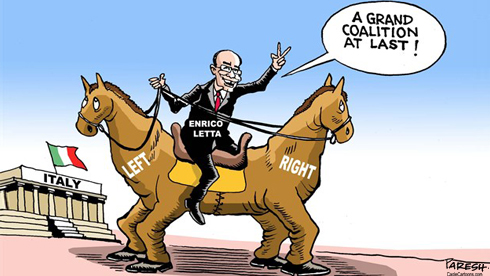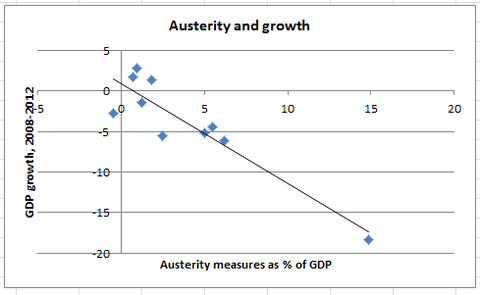What is the economic policy of the new Italian government? I bet no one can answer this question. On the one hand, the Democratic Party (PD)-or at least some of the ministers- emphasize the importance of cutting taxes on the labor market in order to boost employment. On the other hand, B (that just stands for Berlusconi since it’s hard to believe the existence of a structural party behind him) is obsessed with the repeal of IMU (a tax introduced by Monti on real estate). The problem is that PD and B are sitting at the same table, the Government. Both, however, stress the importance of maintaining the promises made to the EU (i.e. keeping the budget in order, whatever it takes) but at the same time say we need more investments to shake up the real economy.
Well, guess what? The two policies are mutually exclusive, especially in times of crisis. We either expand spending or we cut it. We either choose Keynesian economics or we go for Austerity. This choice mirrors the debate going on between Paul Krugman and Alberto Alesina, the first being of course the Keynesian and the second the Austerian from Bocconi. Krugman criticizes Alesina and Ardagna’s paper arguing that there is no evidence that spending cuts lead to economic expansion. In the Euro area, indeed, austerity has produced the situation in the graph below:
Alesina, in turn, replied Krugman saying “My paper has never claimed that every fiscal adjustment is expansionary. It just claimed that there have been examples in which some well-designed policy packages, based on spending cuts and other measures, have been associated with a positive impact on the economy.”
As I already pointed out in my previous post, the bottom line stays the same: it’s the boom, not the slump the right time for austerity. We all know how badly Italian governments have blown up taxpayers money for the past 30 years or more, and how much money ends up in corruption. I do believe there are sectors where spending must be cut (one example above all, eliminating provinces, a useless administrative layer that sucks money and makes our infamous bureaucratic system even slower).
Yet, do we really think that lying off thousands of people right now will help boosting our economy and keep our budget in order? With an unemployment rate at 11,5% and a big credit crunch, our priority is creating employment and this is why we need more spending now. The US went that way and they are getting out of this mess. We, in Europe, are falling even deeper into it.
So what is the incumbent government doing for our economy? Absolutely nothing. First of all because of its inherent weakness (Left and Right can hardly agree on what the recipe should be, assuming they have any idea about what should be done at all). Second, because we don’t have the guts (and the credibility, since the rest of Europe laughs at us seeing Berlusconi once again) to renegotiate the Fiscal Compact within the EU.
The priorities of our politicians are clearly different. While PD proposes to ban “movements” from running for the next elections (clearly targeting the Five Stars Movement), the Five Stars can’t discuss anything else than how much their own elected MPs should spend for lunch or dinner; B, of course, has a more compelling priority in times of crisis and proposes to halve the term of imprisonment for the people charged with association with the Mafia. This will definitely help restore our economy.
——————————————————————————————————————————————————————————————————————–
Qual è la politica economica del governo Italiano? Scommetto che nessuno abbia una risposta a questa domanda. Da un lato, il PD⎯o almeno alcuni ministri⎯mettono al centro la questione della riduzione delle tasse sul lavoro al fine di sostenere l’occupazione. Dall’altro lato, B (perchè tanto è inutile di parlare di PDL dato che non c’è alcuna struttura partitica dietro di lui) è ossessionato con l’abolizione dell’IMU. Il problema è che PD e B sono seduti allo stesso tavolo, il Governo. Entrambi, tuttavia, sottolineano l’importanza di mantenere le promesse fatte all’UE (tenere i conti in ordine, a qualsiasi costo) ma allo stesso tempo dicono che abbiamo bisogno di più investimenti per dare una spinta all’economia reale.
Ebbene, indovina un po’? Le due politiche sono alternative l’una all’altra, specialmente in tempi di crisi. O aumentiamo la spesa o la tagliamo. O scegliamo una politica economica keynesiana o continuiamo con l’austerità. Questa scelta rispecchia il dibattito tra Paul Krugman e Alberto Alesina, il primo naturalmente rappresentante di Keynes e il secondo dell’austerità bocconiana. Krugman critica un paper di Alesina e Ardagna affermando che non ci sono dati empirici a testimoniare che tagli della spesa corrispondano a crescita economica. Nell’area euro, infatti, la politica di austerità ha prodotto la situazione del grafico qui sotto:
Alesina, allo stesso tempo, risponde a Krugman dicendo “Il mio paper non ha mai affermato che ogni misura fiscale porta crescita economica. Dice solo che ci sono esempi dove pacchetti politici ben strutturati, basati su tagli della spesa, hanno un impatto positivo sull’economia.”
Come ho già descritto in un post precedente, la morale della favola è sempre la stessa: il boom economico, non la recessione, è il tempo appropriato per l’austerità. Tutti noi sappiamo come i governi italiani abbiano sperperato denaro pubblico negli ultimi 30 anni o più e quant’altro denaro sia stato mangiato dalla corruzione. Anch’io credo che si debbano fare dei tagli (un esempio su tutti, le province).
Ma siamo sicuri che licenziando migliaia di persone proprio in questo momento di crisi possa aiutare la ripresa economica? Con un tasso di disoccupazione all’11,5% e in una situazione di ristrettezza del credito, la priorità è creare occupazione ed è per questo che dobbiamo aumentare la spesa adesso. Gli USA hanno preso questa strada e stanno uscendo dalla crisi. Noi, in Europa, ci stiamo sempre più dentro fino al collo.
Quindi, cosa sta facendo il nostro governo per l’economia? Assolutamente niente. Prima di tutto a causa della sua debolezza interna (Destra e Sinistra difficilmente troveranno un accordo sulla ricetta, ammesso che abbiano alcuna idea di cosa si debba fare). Secondo, perché non abbiamo gli attributi (e la credibilità, dato che ci ridono dietro in tutta Europa vedendo ancora una volta Berlusconi) di rinegoziare il Fiscal Compact a livello europeo.
Le priorità dei nostri politici sono chiaramente diverse. Mentre il PD cerca di mettere al bando i “movimenti” (ostacolando chiaramente l’M5S), l’M5S è tutto rinchiuso nella sua discussione su quanto debbano spendere per pranzo e per cena i propri eletti in Parlamento. B, naturalmente, ha un’idea ben chiara delle priorità del Paese e propone di dimezzare la pena detentiva per il concorso esterno in associazione mafiosa. Questo sì che aiuterà l’economia del nostro Paese.


This is interesting. The disarray is sad really. In Ireland we have a strong coalition hell bent on an austerity agenda, and yet we get similar results!! Maybe the politicians are impotent (not You know who, of course), and it doesn’t matter what the policies are, the result is the same. Paddy
Hey Paddy! Thanks for your comment! It’s sad but mostly idiotic. It’s crazy how we still pursue austerity despite it clearly does not work!
[…] Krugman vs Alesina and the Italian Stalemate – Krugman contro Alesina e l’impasse i… […]